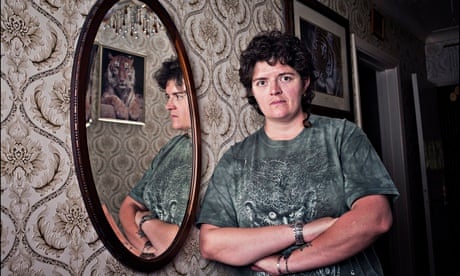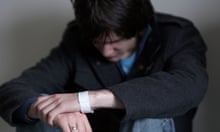Laura Sherlock used to be a professional musician, playing the sackbut, a form of early trombone, in ensembles around the world. She is clever, talented, has a great sense of humour and takes antipsychotic drugs to silence the voice of an evil god in her head.
Meeting her, talking to her about everyday things, nobody would have any idea that Sherlock has a mental-health problem. She defies the tabloid image of schizophrenia as a disturbing and dangerous condition. Schizophrenia is, says Mark Winstanley, acting chief executive of Rethink Mental Illness, "one of the most stigmatised and misunderstood conditions in the UK". It is relatively common, affecting one in 100 people, and those who live with it are no more likely to become violent than the general population.
The only person who has been damaged by Sherlock's schizophrenia, diagnosed in 2001 when she was 33, is herself. Her career, which involved playing in theatres such as the Globe and travelling to Europe, Japan and Australia, is over; but thanks to the support of her family, she says many times, her life is not.
She pinpoints the start of her mental-health troubles to depression that set in when she was a student at the Royal College of Music. A member of one of the country's leading orchestras came to talk about careers – and essentially told the students they would not have one.
"He was the most damning person I've ever heard – not in a nasty way, but he was saying there was no future for us," said Sherlock. "He was saying: 'You'll all end up as peripatetic teachers. All the performance jobs out there are held by people like me who are middle-aged, have got divorces to pay for, houses to pay for, children to pay for. We're not going to give our jobs up for another 20 years.'
"He was probably being honest and telling us how it was, but for me that set me off on a downward spiral."
After an initial misdiagnosis, Sherlock's GP put her on antidepressants. But while they lifted her mood, they did not prevent the questioning that had begun in her mind. "I was brought up a Christian – not a sort of mega, mega Christian, just a general upbringing – and I was quite sort of spiritual in my time at college, praying and all that sort of thing. I couldn't work out how a good god who was meant to be all-powerful, all-knowing, who created everything and was totally good, he could let all the evil stuff in the world happen," she said.
She approached this quandary as she had done with philosophy at school. "I was drawing mind maps, writing essays, everything to try to work it out. In the end, I decided that God isn't good and actually he's evil and it's all a kind of illusion – the idea that we have control and that we can make decisions ourselves. It's all just a game to him. He watches us as if we were in a play or a movie and the only thing we do have control over is our emotions, and that's what makes it interesting for him because he causes all the bad things to happen in the world, all the natural disasters, war and murders, all that sort of thing, and he likes watching our reactions to it."
The crisis came in 2001, when a relationship broke up with no warning, she said. The man had been only her second boyfriend and they had been discussing whether to live together on a canal barge, as they couldn't afford a flat. After her first break-up, at the age of 17, she had thrown herself in front of a car. This time, God began to speak to her.
Before the split, she had been doing really well. "I went into early music and I played with the Gabrieli Consort, the King's Consort – I was playing with all of them. I was really starting to make a name for myself."
In her youth, when she was depressed, she had prayed for a benign god to speak to her and help her. But the voice she now heard in her head was the evil god she had decided was toying with the world as if playing a game of chess or, more violently, the video game Call of Duty.
As well as telling her to take too many tablets and cut herself, this god made her do what she calls "really grim stuff".
"God was telling me that I had to obey him and if I didn't obey him all the time and do everything he said, he would hurt my family – and my family were just the most important thing to me. He'd ask me to do weird stuff, like get down on my hands and knees in the town centre and kiss and lick the ground. I was frightened – I was really frightened for my family so I would have done anything to prevent them getting hurt," she said.
After a couple of weeks, she talked to doctors. A psychiatric consultant wanted to put her in hospital to prevent her from harming herself, but agreed to the proposal from Sherlock's very determined mother that she should stay in the family home, on antipsychotic medication. And that is where she has been ever since.
"When I was first put on antipsychotics, I was out of it," she said. "I couldn't even phone my nephew and niece, who were my world." The drugs interfered with her trombone embouchure – the specialised adaptation of a player's lips – though it was three years before she gave up playing entirely.
She is stable now, on heavy medication, although cheerful and lively: these are the drugs sometimes called the chemical cosh. God has gone quiet, although she insists, against all argument and her logical self, that he is there and will speak to her again if she gives up the drugs. She talks of two realities: the familiar one that she wants to live in because her family and friends are there, and the other, where the evil god is. One day, she thinks, he may pay her back for keeping him out of her head all this time.
Mark Winstanley says that schizophrenia is not a life sentence. "Around half of all people diagnosed with schizophrenia recover after one or two episodes. With the right treatment, many others are able to manage their condition and have good quality of life.
"However, for that to happen, people need to get the right support when they become unwell. Sadly, too often that's not the case. Many people with schizophrenia wait for years to get treatment. More than half of people with schizophrenia are not offered recommended talking therapies like cognitive behavioural therapy, and less than 30% receive proper physical checks." In fact, a mere 16% of Rethink's supporters say they have received the full range of treatments recommended by the National Institute for Health and Care Excellence.








